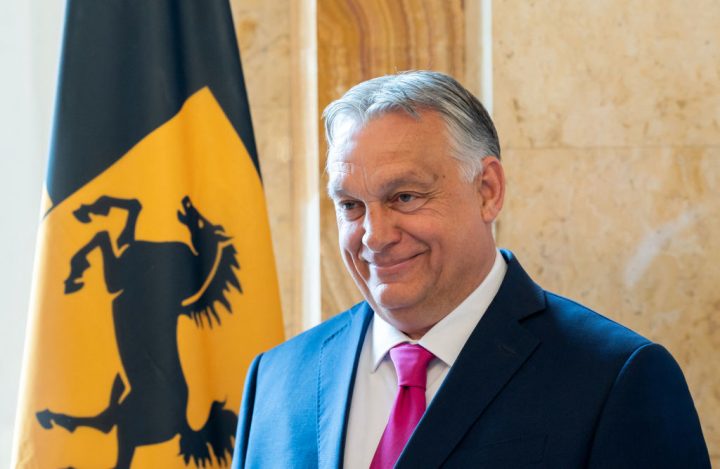Life in the Berlaymont building, the Brussels headquarters of the European Union, just got a bit more surreal. A striking feature of the EU is its rotating presidency, under which the 27 member states take it in turns to do a six-month stint running its technically supreme political body, the European Council. This week, Hungary, the bad boy of Europe, took over the hot seat. It keeps it until the end of this year.
The difficulty is that the government of Viktor Orbán in Budapest, albeit still popular at home, is at loggerheads with the EU. Politically, its scepticism over Ukraine’s war effort and its open dislike for liberal social policies exasperate Brussels; legally, it is under attack over the so-called rule of law, LGBT rights and its intransigence on immigration and asylum. No wonder Brussels looks askance at having to take orders from it, or that Ursula von der Leyen, president of the European Commission, has already taken the symbolic step of calling off a proposed goodwill visit to the Hungarian capital.
Brussels is looking increasingly out of touch with the peoples whose interests it claims to serve
Not that the presidency actually allows Hungary to do very much. No decision of import in the EU can be taken without the say-so of the Commission, and that body, notwithstanding populist successes in EU elections last month, remains firmly under the control of von der Leyen’s liberal ascendancy. Apart from a few ceremonial and bureaucratic functions, the main function of the country holding the presidency is setting the agenda for the Council.
Nevertheless, Hungary’s position does give it some promising opportunities to shake things up in Brussels while nevertheless acting, as the tradition has it, as ‘honest broker’ between the EU and the member States. First, even if it cannot do much of what it wants, its right to set the Council agenda allows it to obstruct a good deal of what it does not want. In eastern Europe there is, for example, unhappiness about the centre’s forays into social policy; it is a fair inference that such matters will be largely kept off the discussions at the table for the next few months.
Second, that same right allows it to set the tone of the discussion that does take place. A country taking on the presidency by tradition expresses some broad aims. Normally these are fairly anodyne: for instance Belgium, Hungary’s predecessor, comfortingly emphasised promoting a global Europe, reinforcing a social and health agenda, and ensuring a ‘green and just transition’ in fighting climate change.
Hungary’s expressed programme, by contrast, is disconcertingly muscular. It aims to force onto the table pressing issues such as bolstering its competitiveness, reinforcing its defence, addressing demographic challenges, and dealing with illegal migration. Another theme which will seriously unsettle the Eurocrats is ‘promoting a farmer-oriented EU agricultural policy’: code for an explosive attack on the current aggressive green EU agenda and a deliberate reference to the farmers’ revolts of the last few months in, among others, France, Belgium, the Netherlands and Germany.
Thirdly, by turning the discussion to subjects he, and not Brussels, wants to talk about, Viktor Orbán may be able to rally other countries such as Slovakia and perhaps even Georgia Meloni’s Italy to be more independent-minded when it comes to dealing with Brussels.
If Orbán succeeds, Brussels will have to deal with, at least, a loss of face. To have to show respect to a country it has been bossing around for years is galling. Furthermore, with Hungary setting the agenda, the EU will find it more difficult to strut on the world stage on such matters as climate change or aid to Ukraine – something countries like China and Russia will know perfectly well.
One suspects the bloc’s machine is resigned to not being able to do a great deal for the next six months. Prior to yesterday, it took quiet steps to rush through the Council a Russia sanctions package and a formal start to accession talks with Ukraine. Today it is no doubt looking forward wistfully to 1 January, when the reliably pro-European regime of Donald Tusk in Poland will take over the reins and (it hopes) restore business as usual.
But behind all this there is a more ominous long-term worry. The European elections last month provided big gains to nationalist parties opposed to EU micromanagement; national elections in Italy a couple of years ago gave a shock promotion to the Fratelli d’Italia under Georgia Meloni. Even if Marine le Pen’s Rassemblement National does not win this weekend’s French poll it will be a close-run thing. Couple that with the farmers’ protests last month, and Brussels is looking increasingly out of touch with the peoples whose interests it claims to serve.
It is true that the EU’s constitution is arranged, rather like that of Bismarck’s Second Reich, to draw as much real power as possible away from the people and towards officials at the centre. But, especially in a system of nation states without a government able in the last resort to impose its will, there are limits to what this can achieve. Unless it treads carefully, in the next couple of decades the EU risks becoming not so much a superstate as a tiresome irrelevance.






Comments